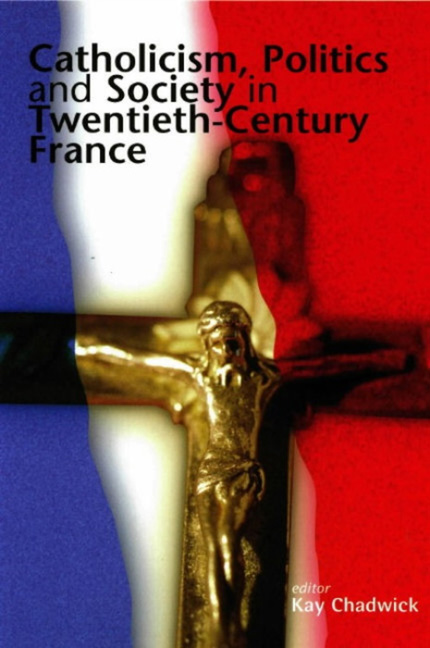Book contents
- Frontmatter
- Contents
- Editor's preface
- Notes on contributors
- Abbreviations
- Introduction
- 1 La laïcité en France au vingtième siècle
- 2 Antisémitisme des catholiques au vingtième siècle: de la revendication au refus
- 3 Catholicism and Nationalism: the Fédération républicaine, 1927–39
- 4 True and false modernity: Catholicism and Communist Marxism in 1930s France
- 5 Ralliés and résistants : Catholics in Vichy France, 1940–44
- 6 Les formes politiques de la démocratie chrétienne en France au vingtième siècle
- 7 Catholicism and the Left in twentieth-century France
- 8 Accueillir l'étranger : immigration, integration and the French Catholic Church
- 9 Yeast in the dough? Catholic schooling in France, 1981–95
- 10 Les femmes catholiques: entre Église et société
- 11 La sociologie religieuse du catholicisme français au vingtième siècle
- 12 Secularisation and the (re)formulation of French Catholic identity
- Select bibliography
- Index
3 - Catholicism and Nationalism: the Fédération républicaine, 1927–39
- Frontmatter
- Contents
- Editor's preface
- Notes on contributors
- Abbreviations
- Introduction
- 1 La laïcité en France au vingtième siècle
- 2 Antisémitisme des catholiques au vingtième siècle: de la revendication au refus
- 3 Catholicism and Nationalism: the Fédération républicaine, 1927–39
- 4 True and false modernity: Catholicism and Communist Marxism in 1930s France
- 5 Ralliés and résistants : Catholics in Vichy France, 1940–44
- 6 Les formes politiques de la démocratie chrétienne en France au vingtième siècle
- 7 Catholicism and the Left in twentieth-century France
- 8 Accueillir l'étranger : immigration, integration and the French Catholic Church
- 9 Yeast in the dough? Catholic schooling in France, 1981–95
- 10 Les femmes catholiques: entre Église et société
- 11 La sociologie religieuse du catholicisme français au vingtième siècle
- 12 Secularisation and the (re)formulation of French Catholic identity
- Select bibliography
- Index
Summary
The inter-war years are usually regarded as a watershed in the relationship between the Catholic Church and political life in France. In this period, it is argued, the Church broke its links with the royalist Action française (AF) and at last accepted that it must work within the Republic. This rapprochement is said to have been encouraged by the unity of Catholics and anti-clericals during the First World War, and by fear of working-class unrest during the troubled post-war years. Whereas politicians became increasingly preoccupied with economic and social issues, the Church shifted its attention from politics to religious matters – supposedly permitting the emergence of a more ‘genuine’ Christianity. The Church's goal, as it had always been, remained the re-christianisation of France, but this would now be achieved through evangelisation rather than by political action against the ‘atheistic’ Republic, and the point of departure of Catholic activity became the parish rather than the political party. The beneficiaries of this reorientation are said to have been social Catholics, who had long held that re-Christianisation depended on severance of the link between Catholicism, social conservatism and Right-wing nationalism. These ‘progressives’ were particularly active in the Catholic trade union moment, the Confédération française des travailleurs chrétiens (CFTC), and the specialist groups of Catholic Action, especially the Jeunesse agricole chrétienne (JAC), Jeunesse ouvrière chrétienne (JOC) and their feminine counterparts (JACF and JOCF), which sought to involve workers and peasants in the work of proselytism. The new militants usually favoured the moderately conservative Parti démocrate populaire (PDP), but they are regarded as having prepared the way for the more Left-wing Catholicism of the later twentieth century.
There are a number of difficulties with this view of the history of Catholicism. To begin with, religion remained an important structurant of political life in France. Practice was still relatively high: as late as 1947, 37% of voters claimed to have attended mass on one of the two previous Sundays. In the 1930s the extent to which voting behaviour was entangled with religious issues was often stressed and, moreover, the flowering of official, semi-official and private associations and interest groups in this period, ranging from school associations to trade unions and welfare organisations, provided whole new areas of conflict between Catholics and anti-clericals.
- Type
- Chapter
- Information
- Publisher: Liverpool University PressPrint publication year: 2000



